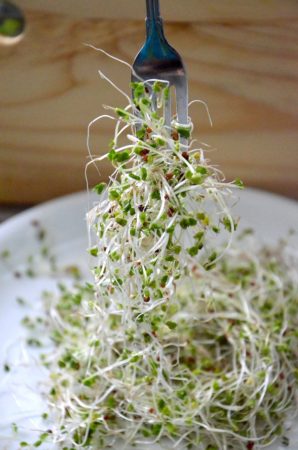 When mom said, “Eat your broccoli” you should’ve listened. The good news is, it’s never too late to start. Why should you? Because there’s an abundance of evidence and studies (cellular, animal, clinical) that prove broccoli and broccoli sprouts are comprised of potent cancer-fighting properties.
When mom said, “Eat your broccoli” you should’ve listened. The good news is, it’s never too late to start. Why should you? Because there’s an abundance of evidence and studies (cellular, animal, clinical) that prove broccoli and broccoli sprouts are comprised of potent cancer-fighting properties.
Jed W. Fahey, ScD., MS, is a professor and researcher at Johns Hopkins University School of Medicine, and Director of the Cullman Chemoprotection Center. He has an extensive background in plant physiology, human nutrition, phytochemistry and nutritional biochemistry. Since the 1990’s he has been involved in researching the potent anti-cancer effect of an activated phytonutrient known as sulforaphane, which is derived from cruciferous vegetables, especially broccoli. Fahey strongly asserts that sulforaphane is a potent inducer of key cytoprotective enzymes that promote detoxification of carcinogens and other anti-cancer effects in humans.
There’s an abundance of evidence and studies that prove broccoli and broccoli sprouts are comprised of potent cancer-fighting properties.
A study published by the late Paul Talalay (MD and professor of pharmacology at Johns Hopkins University) found that 3-day-old broccoli sprouts consistently contain 20-50 times the amount of the chemo-protective compound glucorophanin, the precursor of sulforaphane, that is found in mature broccoli heads. His discoveries helped reveal that these anti-cancer compounds actually reduce cancer risk, in addition providing greater protective properties and cancer-fighting efficacy than mature broccoli.
Studies reveal sulforaphane antioxidant and anti-tumor properties
- In a study of brain cancer cells (glioblastoma) cells, sulforaphane demonstrated apoptotic effects and cellular invasion inhibition, thus helping regulate cancer cell death and mitigating cancer cell migration and invasion into other tissues.
- A recent mouse model study published in the peer-reviewed Cancer Prevention Research Journal also engendered preventative effects, inhibiting breast cancer development. The results suggest exposure to epigenetic modulating dietary agents, such as cruciferous vegetables with sulforaphane (including broccoli sprouts), could be a key factor for maximizing chemo-preventive effects. In other words, the study supports the use of drugs or natural agents to try to reduce the risk of, or delay the development or recurrence of, human breast cancer.
- In the International Journal of Food Sciences and Nutrition, another study exhibited the impact of sulforaphane from broccoli on the interaction between immune and colon cancer cells, thus underscoring its capacity for cancer prevention and cancer development.
A plethora of other studies confirm that sulforaphane, which is heavily concentrated in broccoli sprouts, can play a significant role in helping prevent and fight cancer.
Remember what Momma said: “Eat your broccoli” … and today we know it’s advisable to eat your broccoli sprouts, several times per week.
Of course, effective cancer protocols require a sophisticated multifaceted approach. However, I strongly recommend you include broccoli sprouts as a strong preventative and anti-cancer agent, in your toolbox of comprehensive and effective interventions.
Finally, prior to embarking on any medical or healthcare protocol, intervention or regimen, I recommend you seek the counsel of a qualified doctor or healthcare professional.
Read more nutrition-related posts
Or, learn more in my book, Hope Never Dies.